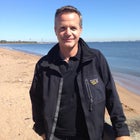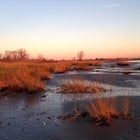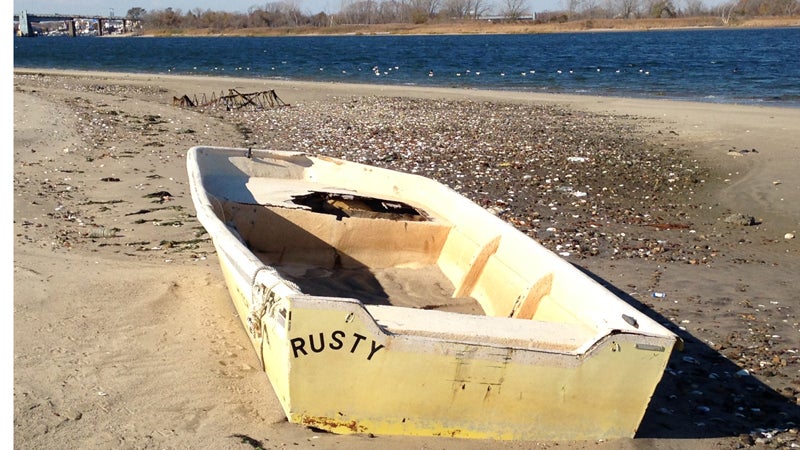I’ve camped in a lot of places—the steppes of Mongolia, the East African bush, the Amazon, countless U.S. national parks and forests—but until recently I had never camped in a city, much less one with nearly nine million people.
 Bill Ulfelder.
Bill Ulfelder. Urban wilderness.
Urban wilderness.��
This summer the National Park Service announced it was expanding its campgrounds in the Gateway National Recreation Area, which includes 38 campsites in and around New York City. Located in the coastal dunes of New Jersey, on Staten Island and in Jamaica Bay, these campgrounds might seem like novelties. But as the world’s population grows to nine billion this century and as more and more people flock to cities, outdoor experiences such as hiking, biking and even camping are critical for city dwellers looking for connections to the natural world. And so, this past Veteran’s Day weekend, I set out to experience a night camping in the urban jungle.����
The experience started like any other trip to a federal campground. I made online reservations for a campsite at Floyd Bennett Field in Brooklyn, near JFK Airport, the busiest international passenger hub in the world. I packed a backpack. I checked the weather. I planned my route.
Floyd Bennett Field is a strange, juxtaposed place. There are the familiar sights of families riding bikes, except they ride along the old, massive landing strips of New York City’s first municipal airport, previously a naval air station. A handful of Boy Scouts sitting around a fire filled the�� campground’s air with the familiar smell of woodsmoke as I made my way to my campsite at the far end of the field. Fishermen cast lines for sea bass, but with the Freedom Tower and Manhattan skyline rising behind them. Migrating geese fly and raptors soar above the beaches, while the dull roar of traffic fills the air.
I spent the day between these two worlds. Marveling at the beauty of the marsh, and appreciating the smell of salt air and the rise and fall of the tide and the natural rhythms of an estuary. All the while jets taking off from JFK flew overhead, and the Rockaways' public housing loomed in the distance. A food truck pulled up on a popular fishing beach, and I remembered that old New York City truth about getting anything and everything any time you want. Campgrounds are apparently no exception.
In the late afternoon, storm clouds rolled in and the temperature dropped. I needed to get my tent up. When I returned to my campsite I realized I was no longer alone. A group of about 20 teenage city kids and their chaperones had arrived and were setting up camp in the sites adjacent to mine. As night fell, the roar of a planes thundered constantly overhead.��After roasting marshmallows, the teenagers began to play games that seemed to oblige shouting and running past my tent into the woods nearby. If I’d been camping with someone else I might have had to yell to be heard. I asked myself, “What the hell kind of camping is this?” just before drifting off to sleep.
I awoke��at 5:15 a.m. It was cold, nearly freezing, and completely still. Not a sound. I quietly slipped past the tents full of sleeping teenagers and headed down to the empty beach. Instead of planes,��the night's sky was full of bright constellations—a star-filled sky like I had never seen before in the city. The tide was out and the wet sand was full of raccoons’ paw prints.
As I sat on the beach and watched the sun's glow spread on the horizon, I could hear bird song in the marsh and trees behind me. I looked around and saw mussels, clams, geese, and the marsh and the forest all beginning to glow in the morning light. The anticipation of the sunrise was exhilarating. And then the sun rose behind the housing projects and warmed my body in the brisk morning air.
When I returned to my site later that morning the teenagers were slowly climbing out of their tents, and it occurred to me that they hadn’t seemed bothered at all by the planes flying overhead, the traffic in the distance, or the strange, solitary guy camping alone in the site next to theirs. Last night they’d pitched tents, roasted marshmallows, told campfire stories and slept in sleeping bags—all on the edge of one of the biggest cities in the world.
As I took down my tent later that day I began to think that as unusual a place as the campground at Floyd Bennett Field is, maybe there is something important going on there after all.


